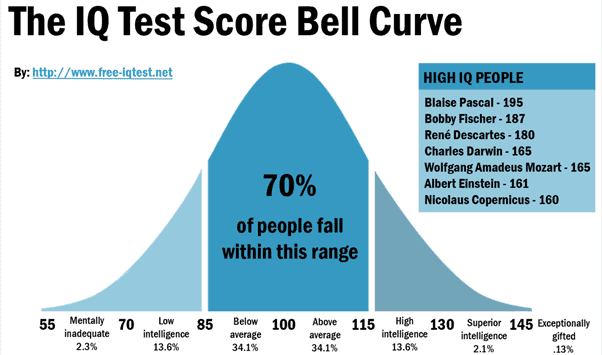The Origins of IQ
When studying important figures in history, a lot of people look at IQ scores. Leonardo DaVinci is estimated somewhere between 180 and 220, Einstein is around 160. Over the years, it’s become less important. It is not a new concept that IQ testing is disproportionate in measuring intelligence. For what used to be an indicator of smarts and level in schools, it’s not really used anymore.
In the early 1900’s, France was trying to place a bunch of children into schooling but needed to know the level each student was at. The French government turned to a man named Alfred Binet, who began developing questions focusing on attention, memory, and problem solving rather than math, science, and areas explicitly taught in schools. From here, he developed a system to take into account “mental age” along with physical age to find a number establishing the child’s level. Binet’s scale was brought to the US, where it was adapted by Lewis Terman in 1928 and called the intelligence quotient (or IQ). Terman’s testing overwhelmingly identified white people as “brilliant people.” Of the 1,528 subjects, two were Black, six were Japanese American and one was Native American. The disproportionate test continues to cause problems for decades as people continue to use the test to justify “scientific racism.”
A racist history isn’t exactly surprising, so there is no shock that the tests are classist as well. In an article by the-ard.com, “What IQ tests actually measure, rather than innate intelligence, seems to be largely how motivated students are when taking the test (Science). Though there is no measurable correlation between intelligence and future wealth (Scientific American), people thinking about financial stress perform significantly worse on intelligence tests (PBS).” Basically, just the stress of having to worry about other things, like money, housing, parents, etc cause students to do worse on tests. There are many studies showing how poverty reduces cognitive ability, so of course this would affect IQ testing. In a 2013 study published in Science, researchers found that for poor individuals, working through a difficult financial problem produces a cognitive strain that’s equivalent to a 13-point deficit in IQ or a full night’s sleep lost.
Not only are less-advantaged kids more stressed, but they usually don’t have access to resources that they should be provided in order to better succeed,“Among rich kids, good opportunities for developing the relevant cognitive skills are plentiful, so IQ differences are driven primarily by genetic factors. For less advantaged kids, though, test scores say more about the environmental deficits they face than they do about native ability,” said cato.org, “IQ tests are good measures of innate intelligence—if all other factors are held steady. But if IQ tests are being used to compare individuals of wildly different backgrounds, then the variable of innate intelligence is not being tested in isolation.”
There is no one way to measure intelligence through a simple test. Everybody thinks differently and everybody considers certain knowledge to be more important. A mechanic doesn’t need to know about how to write poetry in order to be successful. Different backgrounds in life lead to contrasting situations. The implication that students of color and disadvantaged students do poorly on IQ tests due to genetic issues is entirely wrong and we need to work towards a world that helps all students to their best potential and prioritizes hard work rather than disproportionate test scores.







